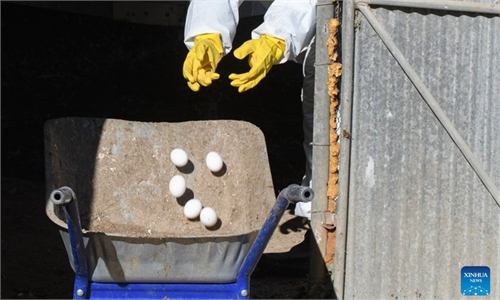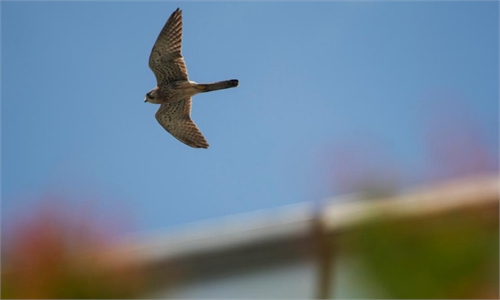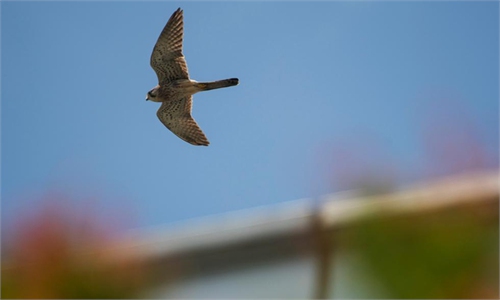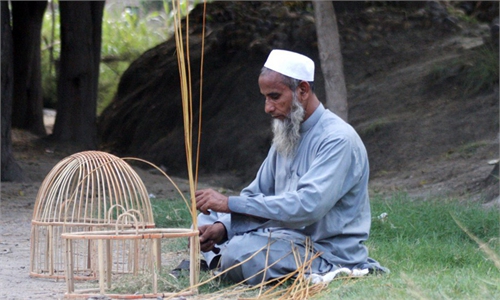ARTS / CULTURE & LEISURE
Rescue workers do their best to protect Beijing’s birds of prey
Back to the sky
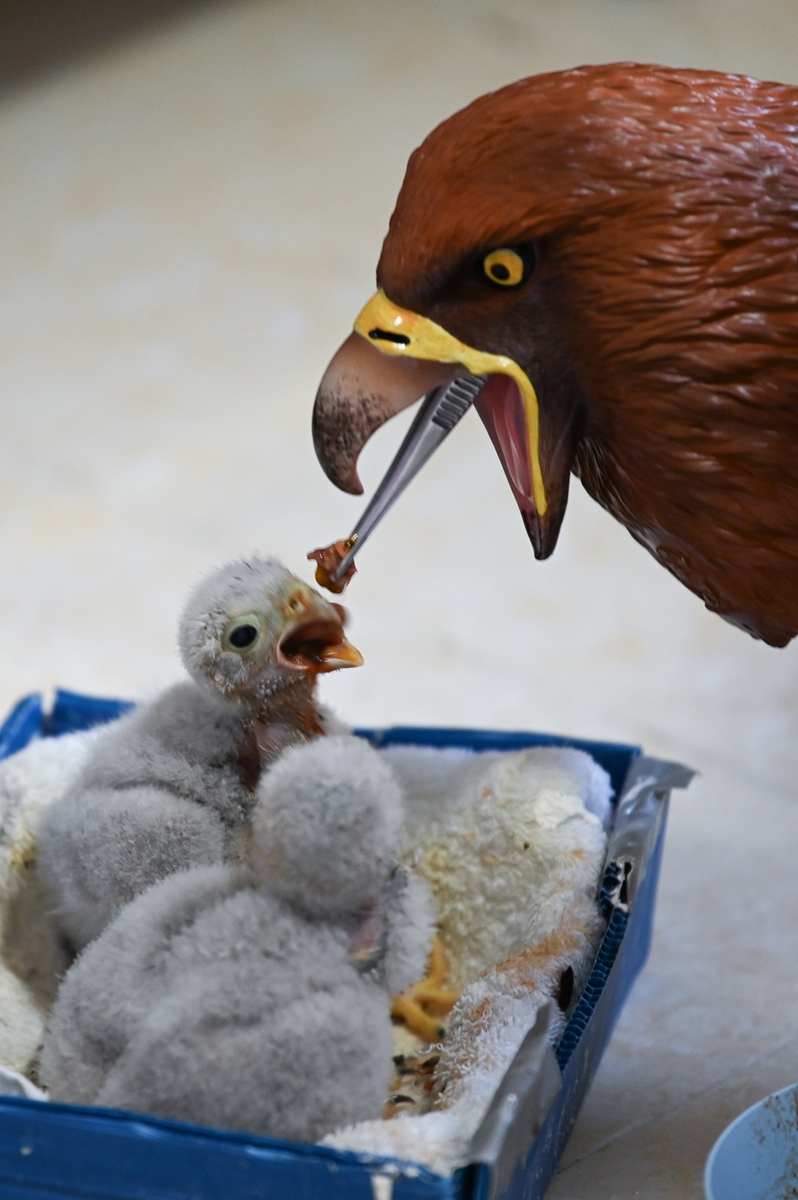
Rehabilitators feed baby common kestrels with a raptor hand puppet. Photo: Courtesy of Beijing Raptor Rescue Center
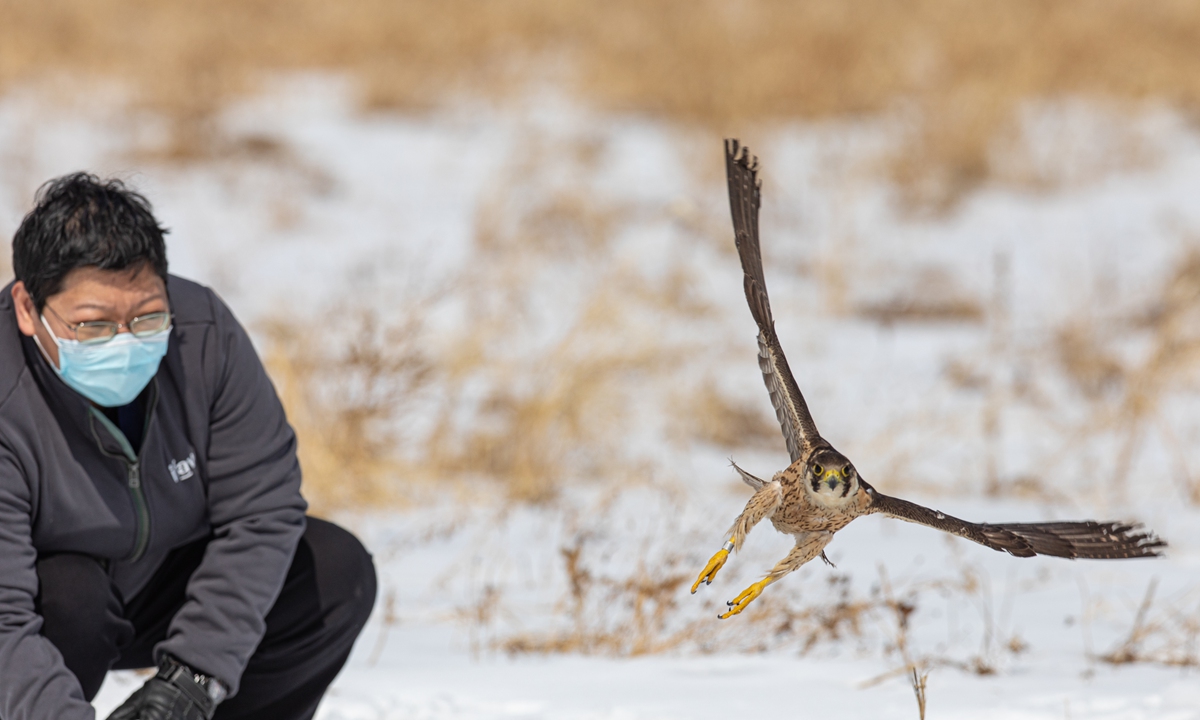
A rehabilitator at the Beijing Raptor Rescue Center releases a Peregrine Falcon on March 20, 2022. Photo: Courtesy of Beijing Raptor Rescue Center
"Unlike pet birds, dogs or cats, these raptors are the top predators in the world. They never show weakness. That is one of the main differences as well as the challenges when it comes to rescue efforts," an employee at the Beijing Raptor Rescue Center told the Global Times.In Beijing, the migration season is about to continue into June. One of the most biologically diverse metropolises in the world, China's capital has witnessed over 60,000 migratory birds passing through within hours on their way to the north of the continent.
In addition to the large number of forest rangers who ensure migrations go smoothly, another special "medical team" also plays an indispensable role at the Beijing Raptor Rescue Center. Their task is even tougher as they must deal with dangerous animals that have sharp grasping talons used to seize prey and a hook-beak used to kill and rip that prey apart.
""Once those tough creatures show their weakness to the surroundings, for example to other predators, it means that they are already badly injured which they could be the food of other animals," the rescue center's senior raptor rehabilitator Zhou Lei told the Global Times, recalling the unusual experiences she has encountered while taking care of predatory birds such as crested bee hawk kestrels and eagle owls.
Strong like Hercules
These rehabilitators described themselves as doctors, trailblazers, powerpoint presenters and teachers, as well as Hercules, the strongest of all heroes in Greek myth.
Zhou recalled her first ever experience rescuing an injured vulture, which was also the largest bird she had ever rescued.
"One wing is as long as the outstretched arm of an adult. When it stretched its neck, it would reach to the level of my chest."
Zhou was a little nervous when she came in close contact with the vulture for the first time. She had to cover its head and eyes with a large towel so the darkness would help quiet it down. Zhou recalled she also had to hold its legs and wings to prevent the more than 10-kilogram creature from fluttering around during the examination and treatment.
"The claws of this raptor are extremely sharp, and a single scratch can easily penetrate cotton glove, so we must wear leather gloves."
Due to these conditions, physical strength is also a requirement for the job.
Recruitment conditions for new workers at the center include being able to "lift 20 kilograms" to ensure they have the ability to handle vultures, the heaviest raptor the center has rescued, and to be able to wear the heavy lead clothing needed while giving injured birds an X-ray sometimes.
For baby raptors, the rehabilitators at the center want to ensure they don't become dependent on human beings, so staff wear little puppets on their hands while feeding them.
Zhou told the Global Times that "under normal circumstances, baby birds' parents will do the feeding in the wild, which is also a period of time when the babies' cognition toward their surroundings is taking shape."
"We need to prevent the rescued baby raptors from developing wrong imprinting behaviors."
Considering the complicated migration route these birds travel, terrible injuries are not uncommon during the season, making it the busiest times of the year for the rescue center.
Changing times
Terry Townshend, a British conservationist living and working in Beijing, talked about the evolution of migratory bird conservation in the capital.
"The police enforcement is much better. So 10 years ago, if I found people trying to catch birds and I called the police, they were not interested in both cases. They were too busy. But now, if I find somebody trying to catch birds, then I have the local police on WeChat and send them the information, and they normally arrive within half an hour. So that's a big change, and a positive change," said Townshend.
Based on the most recent figures the Beijing forestry authority released on April 13, the city's wild bird species increased from 424 to 503 over the past decade, ranking second in G20 capital cities after Brasilia.
Environmental protection efforts, such as programs that helped plant a large number of trees in Beijing, makes the capital a nice transit station for migrating birds traveling north or south depending on the time of the year.
However, Townshend also mentioned the importance of other areas such as grasslands and swamps, as they can also provide a protective environment for migratory birds.
"Trees are valuable when they're the right trees in the right place. But it's also very important to have grassland and open areas and scrub land, because many species depend on these habitats. Many species don't like trees. We have to recognize that and provide the different types of habitats that they need."
